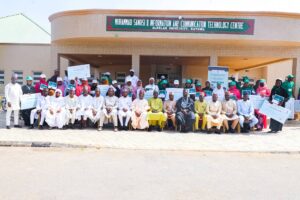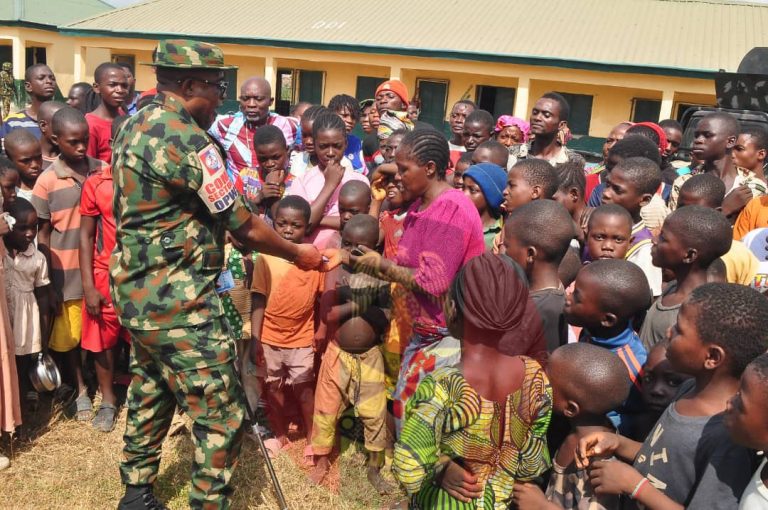The Federal Government of Nigeria, through National Information Technology Development Agency (NITDA), distributed smart agriculture materials to beneficiaries of the National Adopted Village for Smart Agriculture (NAVSA) at the 5-Day Empowerment Programme which took place at Al-Qalam University, Katsina, Katsina State.
NAVSA Programme is designed to accelerate massive job creation, economic diversification and growth, facilitate the integration of digital technologies and innovations in the agriculture processes and practices in order to significantly increase productivity, improve food security, ensure an eco-friendly agricultural practice, attract potential talents and youths into agriculture professions to maximise outcomes.
In this edition, the Federal Government has improved green energy-powered smart brooding to enhance the survival rate of broilers, a smart irrigation system to support a year-long production, and a soil nutrient monitoring system to support information-driven farming on a demo land.
This is in addition to other benefits such as Smart Device, 100,000 Naira seed fund, AgTech training/capacity Building, Connectivity (Internet and CUG), NAVSA Platform, Financial inclusion through digital wallets, e-Extension and insurance services, Continuous reinvestment model opportunities and Unmanned Area Vehicle (UAV)/Drone for a smart farm.
Speaking during the closing ceremony on Friday, the Director General, National Information Technology Development Agency (NITDA), Kashifu Inuwa, who was represented by Ag. Director, Digital Economy Development of the Agency, Engr. Salisu Kaka, stated that “Agriculture remains one of the critical sectors of Nigeria’s economy. This is evident in the policies of the current administration led by President Muhammadu Buhari GCFR. Every economic, developmental, and social policy gives agriculture priority.”
Inuwa said the NAVSA Empowerment will enhance the agriculture value chain, create new value and opportunities through new business models and services, and ultimately enable the creation of millions of jobs while taking people out of poverty and enabling economic growth and diversification.
“With our potential in arable land size and youthful population, modernizing the agricultural sector can change the narrative and multiply the contribution of the sector to the national GDP in many folds. Unfortunately, the sector is the least digitized in the country. It has been proved that any digitized business has the potential to grow exponentially.”
“We hold a social contract to ensure IT drives every aspect of life and contributes to every community and national development as a whole. In line with our mandates, we carry out digital technology-driven interventions in any industry and sector of the economy across the country.”
“This is evident in all digitised economic sectors of the world such as the Bank, financial services, media, and entertainment among others. Undoubtedly, digitization of the economic sectors has proved to be the game changer for economic transformation across the globe.
 It is believed that if the agriculture sector is properly managed and enhanced, it would be a genuine means of eradicating poverty, improving people’s standard of living, diversifying the economy, and creating prosperity for Nigerians,” Inuwa noted.
It is believed that if the agriculture sector is properly managed and enhanced, it would be a genuine means of eradicating poverty, improving people’s standard of living, diversifying the economy, and creating prosperity for Nigerians,” Inuwa noted.
He further said, “We all have it as a duty to ensure agriculture is practised as a business and not a way of life as usual. There is a need to modernise agricultural practices in the country. In view of this conviction and in line with its mandates of universal IT access and integration into every sector of the economy, NITDA has designed a digital technology and ecosystem-driven innovation to address most of our challenges in the agriculture sector.
“The narrative is being changed through NAVSA and other digital agricultural initiatives. This is to support the digitisation of the agricultural sector to address our challenges, exploit the opportunities and accelerate economic growth, in line with the Nigeria Economic Sustainability Plan (NESP) and the National Digital Economy Policy and Strategy (NDEPS) of the Federal Ministry of Communications and Digital Economy.
He added that NESP takes agriculture as a mainstay for economic recovery, diversification, and job creation. The plan proposed a mass agriculture programme to bring 20,000 to 100,000 hectares of new farmland under cultivation in every State of the Federation.
According to Inuwa, the aim is to create 5 million job opportunities, directly and indirectly spanning the entire agricultural value chain, from ‘farm to table’. This can only be achieved by incentivising and engaging millions of Nigerians in farming and agro-processing.
“We have chosen to work with AUK in this edition of NAVSA because we are convinced that being a community-owned institution, it possesses the unique advantage of having a highly sustainable business model that can support the sustainability framework of NAVSA. We will be at the advantage of having the opportunity to prove that community-based innovations are better ways of proffering solutions to our socio-economic challenges.”
“With the NAVSA, we also believe that unemployment, insecurity, and the underdeveloped economy challenges we are facing today in Nigeria can be addressed through agriculture,” he concluded.
https://any.peopleandpowermag.com/fg-set-to-create-five-million-job-opportunities-empowers-smart-farmers-in-katsina/




